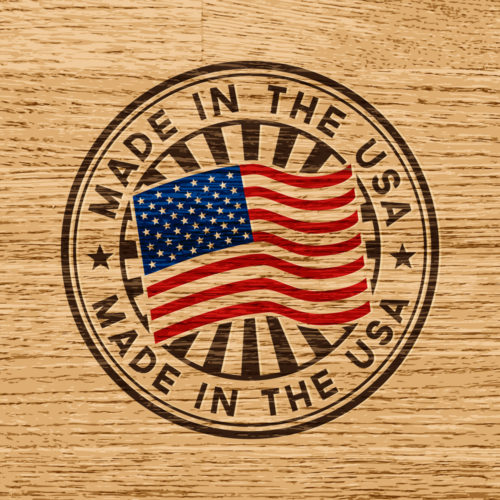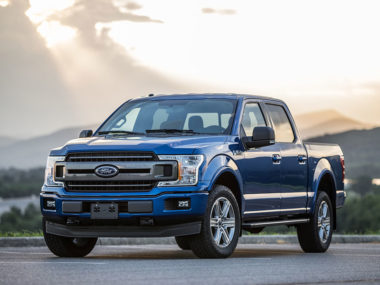Amid an escalating trade war with China, President Trump’s executive orders to “Buy American, Hire American” (2017), “Strengthening Buy-American Preferences for Infrastructure Projects” (2019), and “Buy American” (2019) sparked a renewed discussion about the ways in which buying American-made goods can help the country. Proponents of buying American-made goods argue that purchasing items made in the U.S. can help to create jobs, reduce pollution, and support the local economy.
Table of Contents
“Buy American” Legislation
There are two notable pieces of legislation both known as the “Buy American Act,” including an act issued in 1933 and an act issued in 2019. (These are both different than the “Buy America Act,” which refers to purchases related to rail or road transportation.)
The Buy American Act of 1933
The Buy American Act of 1933 attempted to protect American businesses and jobs by establishing a preference for domestically produced products and construction materials. It was signed by President Hoover during his last full day in office, and required the United States government to purchase only products and materials made in America.
Trump’s Buy American Act of 2019
President Trump’s similarly named Buy American Act of 2019 is yet another act whose goal is to protect American industries and create jobs for American citizens. Under this act, the end product purchased by the government must be manufactured in the United States, and at least 55% of the components must be of American origin, with at least 95% of the parts required to be of American origin in the case of iron and steel end products.
The act also encourages the Federal Acquisition Regulation Council to consider raising the required percentages even further over time. This act will impose more stringent regulations on government contractors, and may in some cases dramatically increase costs.
The Pros and Cons of Pushes to Buy American Goods
There are both pros and cons when it comes to buying American goods. In principle, purchasing goods made in America helps people support local businesses and the national economy.
In practice, however, global trade and production is often too tightly intertwined for buying American to be a practical alternative in every case. Older Americans, including baby boomers, are often especially interested in purchasing and supporting locally made goods.
The Pros of Buying American Goods
There are a variety of positive aspects to purchasing American-made goods, including boosting the economy and reducing pollution.
- Boosts economy — If you purchase goods and materials made in American, it can significantly boost the U.S. economy. Because you’re paying American companies for American-made goods, that money stays in America, and is often further redistributed to the company’s workers, who will then have more money to spend and invest. This creates a positive economic feedback loop that can encourage the economy toward continued growth.
- Creates more jobs — Proponents assert that purchasing American-made goods also creates jobs for American citizens. While imported goods result in jobs moved overseas, you can encourage further manufacturing and job creation within the United States by purchasing domestic goods. This can help to increase the employment rate and reduce unemployment and homelessness.
- Better for the environment — The United States has stricter regulations when it comes to pollution than some other countries. When you buyAmerican-made goods, it requires less transportation-related pollution.
- Supports fair working conditions — While American-made goods may often be more expensive, this is often because of the higher wages and better working conditions afforded to a company’s employees. While imported goods may be made under poor working conditions, with workers paid pennies on the dollar, purchasing goods made in America helps you ensure that the workers were paid adequate wages and experienced fair working conditions.
- In some cases, higher quality — With goods that are labelled “made in China” often synonymous with low-cost, poor-quality products, goods that are made in America often have a deserved reputation of being of higher quality. While this isn’t always necessarily the case, it’s a good bet that products made in America will be of good quality and free of the harmful chemicals and bacteria that are sometimes present in imported goods.
The Cons of Buying American Goods
Although there are many positive aspects to supporting American businesses and buying American-made goods, there are some downsides. These can include a higher cost for goods and materials, and a more limited selection of products.
- More expensive — Although often of higher quality, American-made goods are also often more expensive. This is due in part to their superior quality, and in part because of the increased regulations surrounding fair working conditions, environmental pollution, and other factors.
- Retaliatory tariffs — A push to purchase only goods made in America, especially when accompanied by tariffs on foreign imports, can often inspire retaliatory tariffs from other countries. These may harm American exports and damage economic growth.
- Exacerbates trade wars — An emphasis on buying American-made goods can also exacerbate trade wars, such as the recent trade war between America and China. Trade wars tend to increase prices for consumers and contribute to financial instability across the globe.
- Limits choice — When you reduce the availability of foreign goods and privilege domestic goods, you’re also limiting the choice of available options. While unlimited choice can often be a mixed blessing, it’s still a downside worth considering when purchasing American-made goods and materials.
- In some cases, poorer quality — While American-made is usually synonymous with higher quality, this isn’t always the case. In some cases, such as with the automobile industry, imported goods can sometimes be of higher quality.
How to Find and Buy American-Made Products
While many Americans prefer American-made products, most people have a hard time actually identifying authentic American goods. It can also become confusing to identify products that are made in America when parts or materials may have come from elsewhere.
According to the Federal Trade Commission, all or almost all materials related to a product should be from the United States, and it should be manufactured in America before it can qualify for the “Made in USA” tag. Some people erroneously claim this label even when parts and materials are from foreign countries, while other entirely domestic companies fail to label their products as such.
Identifying Fake American-Made Products
When it comes to identifying fake American-made products, there are usually a few telltale signs. You can look for a “country of origin” mark in order to determine if a product is actually from a country other than the United States. Consumers are also encouraged to do their own research when it comes to American-made products, and to file a complaint if they come across a suspicious claim.
The “Most American” Companies
If you’re looking to support American businesses and purchase American-made products, there are a few companies where you can rest assured that what you see is what you get. If American-made goods are something you look for when making purchasing decisions, be sure to keep these companies in consideration.
- Airstream;
- Zippo Lighters;
- Lodge Cast Iron;
- Weber Grills;
- Gibson Guitars;
- Kitchenaid Mixers;
- Crayola Crayons;
- New Balance Shoes;
- Gillette Blades;
- Burt’s Bees;
- Post-It Notes;
- Pyrex Glassware;
- Dr. Bronner’s Soap;
- Igloo Coolers;
- Hallmark Greeting Cards;
- Gorilla Glue;
- Cutco Knives.
Whether you’re curious about the effects of new executive orders or are simply trying to reduce your carbon footprint and shop locally, there are a lot of positives to supporting American-made goods. While purchasing exclusively American products isn’t always possible in our increasingly connected world, it’s usually not a bad idea.
Image Source: https://depositphotos.com/





